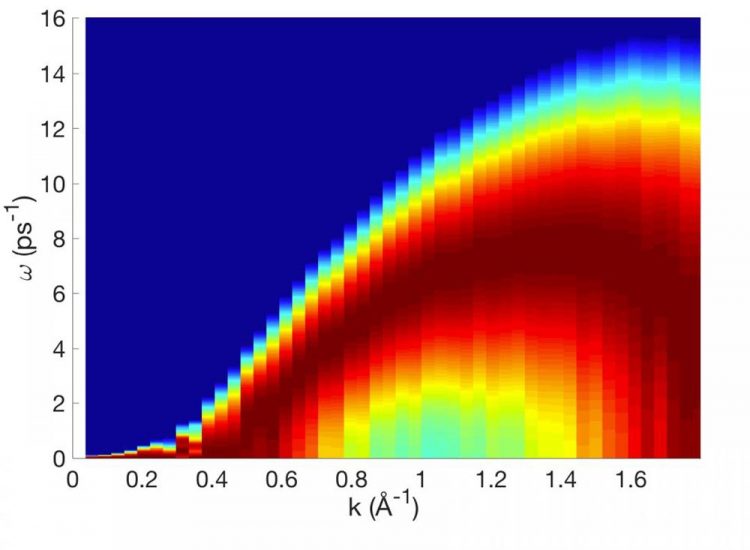Mind the liquid gap: Liquids are capable of supporting waves with short wavelengths only

Emergence of the gap in the liquid wave spectrum seen as the absence of the signal in the low range of k-points. Credit: Kostya Trachenko
Liquids are the least understood state of matter and for a long time it has been believed that they can sustain both gas-like waves with long wavelengths and solid-like waves with short wavelengths, but it wasn't clear just how solid-like waves propagate in liquids.
The researchers found that a gap emerges in the liquid wave spectrum. This gap implies that only short-wavelength solid-like waves can propagate. This understanding will allow researchers to develop the theory of the liquid state and opens new avenues of research into liquids.
Using the predictions from their recent theory, the researchers have performed an extensive modelling study to ascertain the gap and discuss its properties in the journal Physical Review Letters.
Lead author Dr Kostya Trachenko said: “This result is important for the fundamental understanding of liquids and gives us hope that we are getting close to constructing a consistent theory of this elusive third state of matter. We have good theories of waves in solids and gases but, surprisingly and despite many decades of research, not in liquids.”
He added: “The difference between liquids and solids is that particles rearrange in liquids with a certain frequency – this enables liquids to flow. These rearrangements disrupt the propagating waves but they do so in an interesting way. You can think about these motions as microscopic demons living in the liquid which eat all long-wavelength solid-like waves but leave short-wavelength waves intact. In other words, flowing liquid particles act as wave filters which is an insight not hitherto anticipated.”
The results are also important for widening and optimising industrial processes where supercritical fluids have started to be widely deployed including in cleaning, extracting and environmental applications.
Media Contact
All latest news from the category: Physics and Astronomy
This area deals with the fundamental laws and building blocks of nature and how they interact, the properties and the behavior of matter, and research into space and time and their structures.
innovations-report provides in-depth reports and articles on subjects such as astrophysics, laser technologies, nuclear, quantum, particle and solid-state physics, nanotechnologies, planetary research and findings (Mars, Venus) and developments related to the Hubble Telescope.
Newest articles

After 25 years, researchers uncover genetic cause of rare neurological disease
Some families call it a trial of faith. Others just call it a curse. The progressive neurological disease known as spinocerebellar ataxia 4 (SCA4) is a rare condition, but its…

Lower dose of mpox vaccine is safe
… and generates six-week antibody response equivalent to standard regimen. Study highlights need for defined markers of mpox immunity to inform public health use. A dose-sparing intradermal mpox vaccination regimen…

Efficient, sustainable and cost-effective hybrid energy storage system for modern power grids
EU project HyFlow: Over three years of research, the consortium of the EU project HyFlow has successfully developed a highly efficient, sustainable, and cost-effective hybrid energy storage system (HESS) that…





















